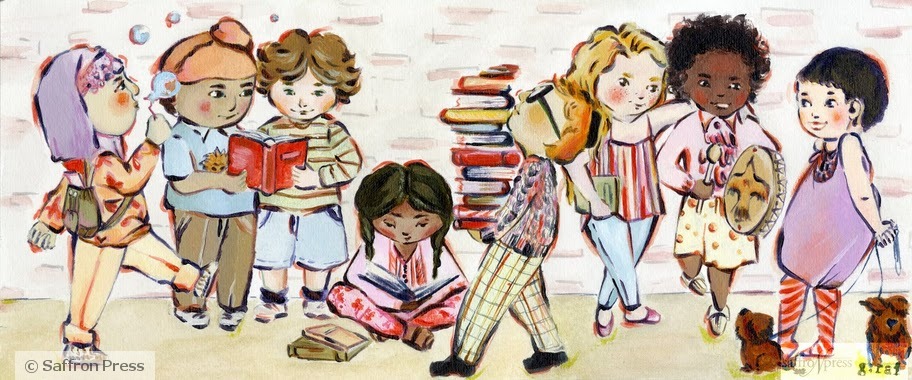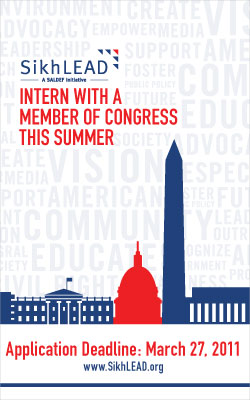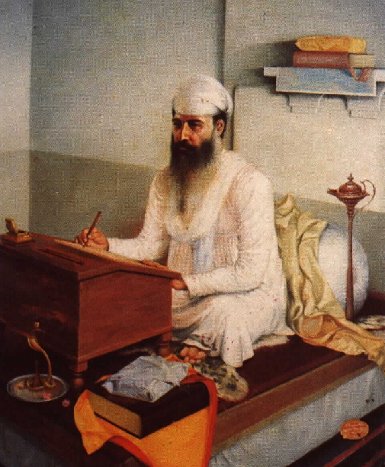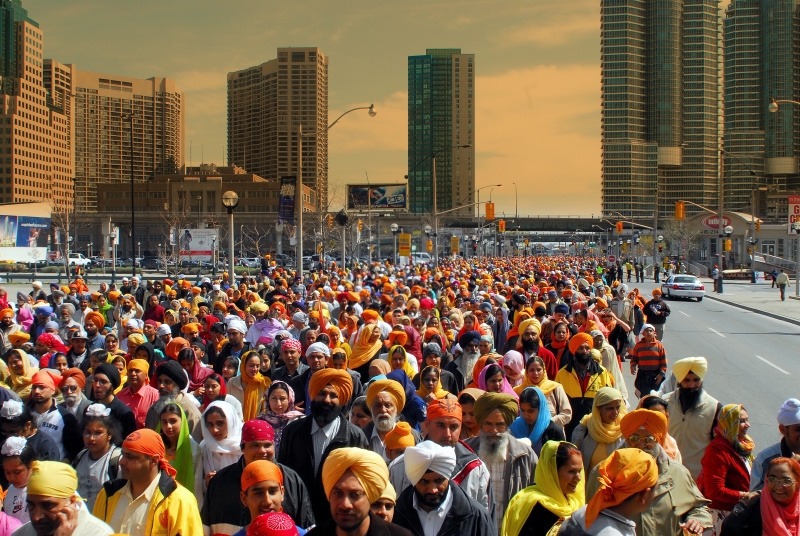
Guest blogged by Navjot Kaur
Usually, I can take quite a lot before something unsettles me. Today, my pressure cooker was whistling.
When you think things can’t get much worse, they have a way of doing just that. When it rains, it pours, right? As I went to pick up my son at the end of his second day in Kindergarten, he appeared at the exit door with his patka almost off his head. I thought to myself, they probably had Gym class. But that wasn’t the case. I was quickly informed that another Kindergartener had pulled my son’s patka off his head while he sat on the carpet. I almost cried but didn’t. I felt angry but held it together for my son’s sake. I questioned whether it had been an action of curiosity? I hoped that the response would be positive but it was not. Bullying, in Kindergarten.
 Yes, my son looks different in many ways. He has his visible faith-identity and he also has his deaf identity. He’s smaller than his peers and he has some special challenges but his personality is like the sunshine. Its rays can trickle into even the darkest cracks and brighten up your day. I would not allow this incident to darken his future school days.
Yes, my son looks different in many ways. He has his visible faith-identity and he also has his deaf identity. He’s smaller than his peers and he has some special challenges but his personality is like the sunshine. Its rays can trickle into even the darkest cracks and brighten up your day. I would not allow this incident to darken his future school days.
We came home and once we had cuddled, I reassured him when he asked, “You’re going to tell [boy’s name] to say sorry to me?” I went into another room and cried. I’m not sure why I felt so defeated for that tiny moment but I did. Nevertheless, after talking to my sister, who works for a non-profit organization lobbying for change on such issues, I gained my strength and prepared next steps.
A Pakistani friend of mine from Lahore passed on a video about a 70 year old man named Mushtaq Ahmed from a Punjabi village near Gujranwala, who just complete his MPhil and will be starting his PhD soon in Education.
With five daughters and three sons, Mushtaq Ahmed completes all his necessary farm work, including working in the field and managing and livestock, while carrying his books with him. His plans are ambitious: to go to the university and teach, because for him, ‘Being a Muslim, we should get education from cradle to grave.’
Here’s the clip:

I couldn’t help think about how this applies to our community. My intention here is not to distinguish from people who are ‘parrd’ or ‘unparrd’ or the class implications this has in the Sikh community in Punjab and the Diaspora. (I’ve met many unparrd/’uneducated’ people who were far wiser than those who were parrd/‘educated’ in some of the most expensive universities in the Diaspora and in the watan. I don’t like those terms myself but just laying out what’s what.) From a Sikh point of view this type of distinction is quite counter productive and has nothing to do with living a life that is Guru-centered.
Guest blogged by Pataka
 The intersections between Sikhism, gender issues, and academia have always been tenuous and fragile ones. As other posts on this blog have mentioned, there have been some recent pushes to democratize academic research as well as examine and undo the longstanding patriarchy which has surrounded academia in general by including discussions of gender politics as well as Sikh women scholars. For more information on SAFAR take a look at previous posts on this issue or visit their website: www.sikhfeministresearch.org .
The intersections between Sikhism, gender issues, and academia have always been tenuous and fragile ones. As other posts on this blog have mentioned, there have been some recent pushes to democratize academic research as well as examine and undo the longstanding patriarchy which has surrounded academia in general by including discussions of gender politics as well as Sikh women scholars. For more information on SAFAR take a look at previous posts on this issue or visit their website: www.sikhfeministresearch.org .
Our Journeys Conference 2011
On October 1st, 2011, SAFAR –The Sikh Feminist Research Institute will host a one-day conference entitled Our Journeys Conference 2011 at The Centre for Women’s Studies in Education (CWSE), Ontario Institute for Studies in Education of the University of Toronto (OISE), University of Toronto, Ontario, Canada.
Guestblogged by Mewa Singh
This past week members of the College Sikhs Collaborative and the Jakara Movement – created the first Alternative Spring Break – explored the issue of immigration by visiting so-called ground zero – the Mexi/Cali border. While the surge of the Tea Party movement has helped bring nativist sentiments to the fore, the Sikh-American response on the issue has been largely muted. In 2006, we saw huge protests calling for a more open immigration policy, led largely by our Chicano/a and Latino/a brothers and sisters. As is too often the case, Sikhs, who are also directly affected by issues of immigration – both documented and undocumented – remain passive bystanders to the national debate. [For those that do not know about the increasing number of Punjabi undocumented workers – including over 1600 that were caught and detained in 2010 alone, see the LA Times article ] Even worse, is some Sikhs even support candidates that have borderline racist views on such issues. While groups such as Sikh Coalition and SALDEF have tacitly supported the cause of immigration cause, it is a shame that we have not been more vocal. Without standing with others (especially on those cases where we have a self-interest!), why should anyone stand with us on the issues we care about?
Day 1 – Orientation Our trip began with an orientation with our partner organization – Border Angels.
This post by our Mehmaan is none other than Harinder Singh. About Harinder Singh – he works with the Sikh Research Institute and the Panjab Digital Library to address all things Sikhi and Panjabi. http://twitter.com/1force
I have taken some time off to be Mr. Mom while my wife is on a work assignment in India. In preparing to make the move to Bangalore, I was excited about being in the land of MS Subbulakhsmi (renowned Carnatic vocalist) and Kalmane (locally grown 100% Arabica beans) coffee. Being here for about three weeks, this is what I have discovered: people are nicer than the North, infrastructure is horrible, and there is not much to see in the city. Even Frommers.com couldn’t come up a list of not-to-be-missed attractions in Bangalore, though people in India claim it to be a great city. I guess the new IT opulence has brought in pubs and gigs only (it is common for Indians to end almost every sentence with ‘only’).
Yesterday, I picked up my son Jodha Singh from the pre-school he is enrolled in here. His teacher said, he wouldn’t play Holi (“Festival of Colors”—though bastardized; some “celebrants” today throw sewerage on people as well!). Now, the legend of Holika is vanishing and so too the spirit of post harvesting thanksgiving prayer to the Almighty. Apparently, Jodha was upset when other children were throwing water and colors on him. I told Miss Priya that his aversion may have come because he has not partaken in this festival as the Sikhs of Panjab have a little reason to celebrate. She wasn’t sure how to respond; do most Panjabis and Sikhs know how to “play Holi?”
 The Sikh American Legal Defense and Education Fund (SALDEF) has announced the Congressional Internship Program (CIP) as part oftheir new initiative called SikhLEAD. The objective of SikhLEAD is to inspire, train, and support motivated and enterprising young Sikh American leaders as they prepare for a lifetime of community engagement and community leadership. The CIP is the first effort under this new and dynamic initiative.
The Sikh American Legal Defense and Education Fund (SALDEF) has announced the Congressional Internship Program (CIP) as part oftheir new initiative called SikhLEAD. The objective of SikhLEAD is to inspire, train, and support motivated and enterprising young Sikh American leaders as they prepare for a lifetime of community engagement and community leadership. The CIP is the first effort under this new and dynamic initiative.
SALDEF’s CIP partners with congressional offices to place Sikh American college students in internship positions on Capitol Hill with members of Congress. Through this program, students will be afforded first-hand perspective into the functioning of the federal government, as a way of providing experience-based training to individuals interested in civic engagement and government affairs.
Through the experience of interning in a congressional office, interns will:
- • explore a potential career track
- • create a network of professional and personal contacts
- • develop real-world skills
- • build confidence and professional work habits
The application deadline for summer 2011 internships is March 27th, 2011!
Visit www.sikhlead.org for more details and to apply. Spread the word and tell your friends about this exciting opportunity.
I recently came across information about Speaking in Tongues, a documentary which follows four diverse children on a journey to become bilingual. As the website states, “At a time when 31 states have passed “English Only” laws, four pioneering families put their children in public schools where, from the first day of kindergarten, their teachers speak mostly Chinese or Spanish.” Before I continue, take a peek at the trailer:
The film discusses the growing need that parents are feeling to raise their children multilingual.
 Guest blogged by Pataka
Guest blogged by Pataka
As a student interested in Sikhism, visiting the library can be a somewhat dismal affair. Searching for academic works on Sikhism leads to few results. Searching for specific topics within Sikhism – for example, gender and Sikhism, lead to even fewer results.
The elitist institutionalization of scholarly research has often excluded marginalized groups and voices: those whose native language is one other than English, members of the working class who cannot afford to pay tuition and fees, single parents, seniors, people living with disabilities, immigrants, refugees and so on. It’s no stretch to imagine that one of the reasons that there is such little research available on Sikhism is due to the fact that we are a marginalized community, both in India and in the diaspora.
While many ‘professional networking’ organisations targeting Sikhs exist, the elitist spin on these events exclude those who may not be ‘professionals’ – students, stay-at-home parents, the unemployed or retired. A push towards inclusive, collaborative open-access community events highlighting Sikh research can foster healthy debates, increase social interaction between different generations of Sikhs on topics of interest, and ensure that Sikh history and Sikh thought are included within the large canon of scholarly literature. Democratizing academic research can also facilitate collaborations between academics and Sikh community groups on issues of concern.
Book your flight, complete your registration, and plan on attending Sikholars 2011 now. This wonderful event will be held at CSU East Bay (Hayward, CA) from February 25-27, 2011. Having attended last year, I can say that this is one of the few forums in the community to engage in critical thought, intellectual stimulation, and meet other like-minded people in the community. The event is geared towards Sikhs, ages 25+.
In addition, this year there will be a number of evening dinners, mixers, and functions to allow young Sikhs to network and make important connections. I will definitely be in attendance and hope many of our TLH readers will be too. Visit the Sikholars website and REGISTER NOW as I have been told there is limited seating and they will fill up (especially by Canadians!).
 After the massively successful Sikholars 2010 conference in February of this year, graduate students will be congregating again next February for Sikholars 2011.
After the massively successful Sikholars 2010 conference in February of this year, graduate students will be congregating again next February for Sikholars 2011.
After speaking to organizers, I have been informed that the deadline for proposal submissions (due to massive requests as many students were taking finals) will be extended until December 31, 2010.
Visit the Sikholars website, check out pictures from last year, and most importantly make sure you are there at:
The Second Annual
Sikholars: Sikh Graduate Student Conference
A Community on the Move: Global and Local Sikhs
February 25-27, 2011
Continue below the fold for some general information about Sikholars.
Saanjh Sikh Scholarship has announced its 2010 Saanjh Scholars and awarded scholarships to four California high school students entering institutions of higher education. The 2010 scholarship recipients are Amandeep Kaur, Harmanpreet Kaur, Harsimratpal Kaur, and Kamalpreet Sahota.
The Saanjh Sikh Scholarship was commenced by a group of college students who attended Saanjh—the Bay Area Sikh retreat, in 2009. The Saanjh Sikh retreat is held annually in the San Francisco Bay Area, where college students and young professionals come together to learn and discuss Sikhi and contemporary Sikh issues. This year’s retreat will be from October 7-10, in Santa Cruz, CA.
The impetuous behind this effort was to actually start supporting higher education in our community rather than only lamenting the lack thereof. At the Saanjh retreat in August 2009, while discussing the pressing needs of our community, participants organized into different seva groups. The scholarship group took it upon themselves to raise money and support for four modest scholarships to encourage higher education in our community. They then used their various networks—SSA, Gurdwaras, Facebook—to solicit applications from deserving Sikh high school students.
 Many years ago, I attended a demonstration where thousands of Sikhs gathered in the city. Onlookers were curious as to who we were and why we had gathered. As I was handing out information pamphlets, a passerby approached me, took one of the pamphlets, quickly looked it over and in a thick British accent said, “Ah yes…Sikhs! Wonderful religion…wonderful people…brave soldiers…” Then he leaned over to whisper something in my ear and said “…but whoever handles your public relations sucks!”
Many years ago, I attended a demonstration where thousands of Sikhs gathered in the city. Onlookers were curious as to who we were and why we had gathered. As I was handing out information pamphlets, a passerby approached me, took one of the pamphlets, quickly looked it over and in a thick British accent said, “Ah yes…Sikhs! Wonderful religion…wonderful people…brave soldiers…” Then he leaned over to whisper something in my ear and said “…but whoever handles your public relations sucks!”
As I see patterns and trends on the way Sikhs are portrayed in the media, that incident always comes to mind. Seeing how positive acts from Sikh individuals rarely mention the word “Sikh” yet negative acts from Sikh individuals turn in to an “exposé” of our community, I started to wonder how non-Sikhs were learning about us and what can we do to proactively present a more accurate image.
Here in North America, our approach to public relations and education is largely reactionary. After a violent event at a Gurdwara, we explain to the public how Sikhs are not violent. After September 11th, we explained how we’re not terrorists. It seems we spend more time explaining who we’re not rather than who we are.
There are some positive efforts as well. Traditionally, many Sikh communities flood the interfaith networks as a means of outreach. I’ve participated in many interfaith events over the years, and although it may be beneficial for relationship building and dialogue, its impact on educating large parts of society over time is debatable.
In the past few months, somewhere in the plethora of press release emails I receive from Sikh organizations, I learned of two significant initiatives by the Sikh Coalition that seemed to pass quietly without much fanfare.
The famed Grand Trunk Road, stretching from Bengal to Peshawar is made up of legends. Due to the “GT Road” passing through Punjab and the number of Punjabis involved in the transport business, references to the transport network can be found in music and popular iconography.
The road has a long history stretching from its early precursors during the brief rule of Afghan Sher Shah Suri, to greater development and expansion during the reign of the Mughals, finally to its naming as the Grand Trunk Road (GT Road) and paving under the colonial British Raj.
NPR is doing an extended story titled “Along the Grand Trunk Road: Coming of Age in India and Pakistan.” I’ll leave aside the colonial rhetoric of the title – coming of age? who decides? what does that really mean? Regardless there are a series of interesting vignettes as the NPR reporters travel the length of the modern road, through Amritsar and Darbar Sahib. Also enclosed on the story’s website are pictures documenting 150 years of history of GT Road. Do take a listen, or you can stick to Kuldip Manak if you prefer….

 A few weeks back, we attended our first Sikh Parade of the season.
A few weeks back, we attended our first Sikh Parade of the season.
Like every year, we love making the trip downtown to join our sangat and spend a beautiful spring day outside celebrating Vaisakhi. Amongst the sea of kesri dastaars and chunnis, there was keertan, gatka, and jakaaray filling the streets.
As we began marching down the main avenue, I started to notice the passerby’s reaction to us. Some were irritated they had to wait for us to cross the street, some took out their camera phones to take pictures of us, but the vast majority looked, well…confused.
And who can blame them?
None of our floats and few of our signs would make any sense to a non-Sikh. The overlapping keertan, jakaaray, and political slogans were obviously all in Punjabi. And there was little to no interaction between us and the onlookers. I wondered, why did we come here to do this?
If our purpose was to have a nagar keertan and to celebrate Vaisakhi in our own traditional way, then why waste the time and money to do it out here? Why not just do this on our own Gurdwara premises? But if our purpose was to educate the greater community on who Sikhs are, then what exactly were we doing to accomplish that? Sure, many people were taking pictures of us, but was it because of the spectacle we created? Or because people were so happy to see the Sikhs that they’ve heard so much about – followers of Guru Nanak, brave soldiers, and defenders of the downtrodden? Which do you think?
(more…)
 The Sikh Youth Scholarship is a scholarship program created by youth and provided to youth. The Scholarship is open to aspiring Gursikh students residing in New Jersey, New York, Connecticut or Pennsylvania. Students must be high school seniors who plan to attend a four-year college/university and have maintained at least a 3.0 GPA during high school in order to be eligible to apply. In 2009, the program provided $7,500 in scholarship funding to three students. The unique aspect of the program is that the scholarship recipients are now part of the scholarship planning team and can truly give back to the community.
The Sikh Youth Scholarship is a scholarship program created by youth and provided to youth. The Scholarship is open to aspiring Gursikh students residing in New Jersey, New York, Connecticut or Pennsylvania. Students must be high school seniors who plan to attend a four-year college/university and have maintained at least a 3.0 GPA during high school in order to be eligible to apply. In 2009, the program provided $7,500 in scholarship funding to three students. The unique aspect of the program is that the scholarship recipients are now part of the scholarship planning team and can truly give back to the community.
In the first year of the Sikh Youth Scholarship, three scholarships were awarded to Rashmeen Kaur, Amrit Kaur Bhinder, and Tarika Kaur Virdi for the 2009-2010 academic year. The winners are now a part of the Sikh Youth Scholarship Executive Board and have been assisting in the expansion of the scholarship as a means of assisting their fellow students within the Sikh community. The Sikh Youth Scholarship is a completely community funded endeavor, made possible by sevadaars like you. Through your generous donations, we were able to award three scholarships of $2,500 each to these aspiring Gursikhs, in addition to funding their costs for Camp Chardi Kala in the summer of 2009. [From Press Release]
The scholarship program has an informative site where interested students can learn more and apply!
Due to unforseen circumstances, we were notified that the webinar has been postponed until Saturday, March 27, 2010. Register at the link provided below.
—————–
A few months ago, RP Singh wrote a wonderful review of a new children’s book called A Lion’s Mane by Navjot Kaur. The book takes young readers on a journey to cultures around the globe to explore the meaning of the dastaar. The book does an excellent job at celebrating diversity and encouraging inquisition in young readers. While the main character in the book is a young Sikh boy, the author and illustrator worked hard to create a story that was accessible to both young boys and young girls.
Educators are now asking – how can we create gender neutral curriculum and cultivate an environment of bias-free learning? In a webinar titled, “Gender Neutral Teaching: A Sikh Context,” the Sikh Research Institute will be opening this topic up for discussion and looking at gender neutral teaching from a Sikh context. We have an important role as a community to help to facilitate these discussions and ensure that our children and their children have the opportunity to learn in an environment that celebrates diversity. Below you will find information on how to register for this webinar. It sounds like an enlightening and much needed conversation!
Gender Neutral Teaching: A Sikh Context
Presenter: Jasmine Kaur, Director of Education at the Sikh Research Institute
Register here.
We’ve occasionally touched upon the choice that today’s youth make in choosing a career or path. Enough of our peers are already in, or heading towards medicine, and no encouragement is needed in that direction. But good news- now you pre- med students have more options in the U.S.!
med students have more options in the U.S.!
There has long been an imbalance in the demand for seats in medical schools, and the supply of seats available. Bright students have had to travel internationally to study, sometimes learning to study without reliable electricity. However, during the 80s and 90s, only one new medical school was established. This is finally changing. Nearly two dozen medical schools are opening, or might open in the near future. [NYT]
The proliferation of new schools is also a market response to a rare convergence of forces: a growing population; the aging of the health-conscious baby-boom generation; the impending retirement of, by some counts, as many as a third of current doctors; and the expectation that, the present political climate notwithstanding, changes in health care policy will eventually bring a tide of newly insured patients into the American health care system. [NYT]
The interesting aspect of this growth is that many of the creators of these new programs aim to create doctors different from today’s. They claim they will produce doctors who aim to serve immigrant and underserved communities.
Many of the developing medical schools are well aware of such arguments, and are billing themselves as different from traditional medical schools, more focused on serving primary care needs in immigrant and disadvantaged communities. Administrators say that they expect that approach to be buttressed by a shift in state and federal reimbursements from specialists to primary care doctors. [NYT]
In any case, they’ll be closer to home!
Over the past few months, we have come across various articles in the media depicting the state of affairs for students of Indian origin living in Australia. Attacks against Indians (allegedly racially motivated) and, what was perceived to be, a poor response by the police and leaders sparked protests in both Australia and India. Widespread media coverage in India has been especially critical of Australia’s handling of this violence. On the other hand, however, the Indian media’s coverage has been likened to hysteria by many in Australia. Many are saying that the Indian media has done more harm than good in their coverage of the events, and in doing so, have shadowed the real problems faced by students in Australia.
So what exactly is going on? A few days ago we received an email from a TLH reader in Australia who wanted to share his perspective on the situation:
I am a year 12 student from Australia about to go into university and I would just like to express some opnions which I hope you could take to the readers of The Langer Hall. Recently there has been much uproar in the Indian media and community about these so-called racist attacks on Indian students in Australia. It really pained me to hear how such events could occur in what has developed to be one of the most multicultural countries in the world. Having just finished school I can say that the range of cultures and backgrounds which I have been exposed to…has been awesome. In my fifteen years as a turbaned boy I have not once felt like this country holds any form of racist ideas against me. My father has been a turbaned bus driver, and now a train driver for many years and he expresses similar ideas to me… Just recently the news begins to appear through investigations by Australian Police that many of these attacks on Indian students..were in fact carried out by other Indian students. I am not saying that all the attacks that occur…are by Indians…but i am raising the point that Australia is not as bad as many people make it seem. I see in Indian newspapers everyday that there was some attack on an Indian and they request Indians to stop going to Australia. Yet not one paper made mention of the fact that it was Indian students who had been arrested for the murders. Well I suppose that is expected in India… [-KS]
Two great events are happening this Saturday: in San Francisco- “Women in 1984”; in New York- Lahir.
If you’re anywhere near either of these 2 cities, you better be there, or you’ll regret missing out!
Women in 1984
Dr. Cynthia Mahmood’s work deals directly with the issue of militancy and she will discuss the violence in Punjab from the macro lens of India as a democracy.Navkiran Kaur Khalra will speak of her own experiences as the daughter of S. Jaswant Singh Khalra and the heritage of his vision. The Khalra family’s narratives is inherently linked to the states backlash against movements desiring human rights and autonomy.Jasmine Kaur Marwaha, human rights lawyer for Ensaaf, will be discussing the the right to reparations for victims of the November 1984 pogroms, as well as victims of the Punjab counterinsurgency, from a gendered perspective.
By neglecting art, we’ve been neglecting our spirituality. And perhaps vice versa. Perhaps we could practice receiving a little more, instead of doing, as we normally do.
Most of us, especially in Asian communities that so highly value scientific endeavor, and want the next generation to all be doctors, grossly undervalue art. Sadly, this might be stunting our spirituality.
How often have your teachers, parents, and other adults in your life impressed upon you the importance of active effort, purposeful thought, and discipline? The scientific methods we rely upon to explain our environments and the universe all rely on these traits and oh-so-important- rationality. Through decades of education, we’re pounded into submission, learning to accept that rationality is good, and irrationality, bad.
But that’s not entirely true. And in the last week, I noticed that both Japji Sahib and a popular American site (especially amongst techies) bypassed rationality to focus on the importance of a different kind of knowledge – intuition. And it rang true. Intuitively. Irrationally.
From the 13th Pauri of Japji Sahib:

